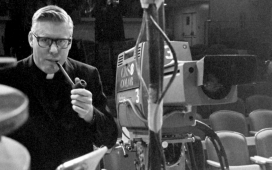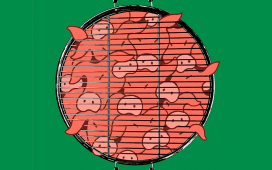Here’s a story: in 2007, a Venezuelan named José Altuve signed a contract with the Houston Astros for fifteen thousand dollars. He wasn’t on anyone’s list of top prospects. Altuve was fast, but he was small—very small, only five feet six (at a stretch). And he couldn’t really hit. For years, he barely ranked among the Astros own best prospects—and the Astros’ minor-league system, back then, was not exactly glittering. In 2012, he finished his first full year in the big leagues, and became an All-Star. That wasn’t saying much—he was an average hitter at best, on a very, very bad team. Near the end of the season, the Astros went 4–34—the worst stretch of any team since 1949. Still, Altuve’s success was a feel-good story. Only that wasn’t the end of it. Over the next season, the Astros organization decided to turn the diminutive Altuve into a power hitter. They came to him armed with data about changing his contact point and the benefit of swinging for fly balls. They taught him a new leg kick. They preached patience. And by the end of the season it worked—remarkably well. He went on to win the batting title and led the majors in hits. By 2017, he was a power hitter batting cleanup, and was named the American League’s Most Valuable Player. During the postseason, he made his mark again and again—sprinting from first base to home on a double to win Game Two of the American League Championship Series against the New York Yankees; hitting a home run against the Los Angeles Dodgers in the tenth inning of Game Two of the World Series; rocketing a three-run homer in Game Five. This year, in Game Six of the A.L.C.S. against the Yankees, he hit a walk-off two-run home run to send the Astros to the World Series.
The reason that this remarkable story exists at all is that the Astros never saw Altuve as a story. If they had, they probably would have concluded that he was overachieving when he reached the major leagues, and never would have pushed him to improve. No one would blame them. “Houston has its very own Little Engine That Could,” Jerry Crasnick wrote, in an ESPN story about the second baseman. (Crasnick also praised Altuve’s “hustle and oversized ticker.”) But the Astros had a new approach, one borrowed from outside of baseball. Already baseball was moving away from the traditional emphasis on experience and relationships, and toward exploiting inefficiencies in the game through analytics. The Astros took that to extremes. Under the new owner, Jim Crane, who made his billions in shipping and logistics, and led by the general manager, Jeff Luhnow, who had spent time prior to working in baseball as a consultant at McKinsey, the team reconstructed its whole approach to building a baseball team. They slashed the payroll and started from scratch. As Ben Lindbergh and Travis Sawchik explain in “The MVP Machine,” they stopped relying on reports from scouts and made a massive investment in data-driven player development. Eventually, they started firing scouts. The problem was that scouts were human. A human eye can’t see the precise way a pitcher’s fingers come off a baseball’s seams, or ascertain the exact exit velocity at which the ball leaves the bat. The other problem with humans is that they are sentimental. They have hidden biases. Their decisions are distorted by loyalty and risk aversion. They have trouble adapting quickly or admitting error. They model the world narratively instead of mathematically, and narratives are always, on some level, subjective. The problem with humans is that they can’t see past their own stories.
The Astros tried to minimize the human element. As Lindbergh and Sawchik write, the team’s front office fired coaches who resisted their techniques and hired coaches they could control. They fired many of their scouts and relied on a group of analysts who studied video and data collected from sensors and cutting-edge cameras. They finely sliced players’ movements, broke their performances down into specialized stats, and tried not to develop relationships with them. They didn’t evaluate players based on the size of their tickers.
What made the Astros invest in Altuve wasn’t that he had a compelling background, or that he was an underdog, or that he was good at karaoke and his teammates liked him. The reason they helped him improve wasn’t that he was a good person. They did it because the data showed he wasn’t meeting the ball far enough out in front.
People were expendable. People could be replaced—probably even Altuve, if that’s what the market dictated. There wasn’t anything wrong with that, by the realities of modern business. The Astros were building a product: a winning team. And, by that measure, their approach worked. During the last three years, the Astros have been one of the most dominant teams in history.
Here’s another story: in May, 2018, Roberto Osuna, who was then a pitcher for the Toronto Blue Jays, allegedly assaulted Alejandra Román Cota, the mother of his child, who was then three years old. After Cota left Canada for Mexico and declined to testify, prosecutors dropped the charges against Osuna. He signed a peace bond with no admission of guilt, agreeing to stay away from Cota and receive counselling. But Major League Baseball conducted its own investigation, after which it concluded that Osuna had in fact violated the league’s Joint Domestic Violence, Sexual Assault and Child Abuse Policy, and suspended him for seventy-five games.
The Blue Jays expressed their support for the league’s decision, and made it clear that, although Osuna was one of the best pitchers in baseball, he would be available for a trade. Osuna was essentially a distressed asset, and the Astros got him cheap. Most teams didn’t want to deal with him, whether because they feared the public backlash or because of their own moral scruples. But the Astros hadn’t built their team by considering their players’ personal histories. They cared about the way Osuna’s pitches would spin, and whether he could help them win, and the low price it would cost them: their own struggling closer and a couple of minor-league pitchers.
To appease unhappy fans, Crane, the owner, made donations to domestic-violence groups totalling around three hundred thousand dollars—or less than five per cent of the base salary that the Astros paid Osuna in 2019. Luhnow, the general manager, also announced that the team had a zero-tolerance policy toward abuse. When it was pointed out to him that dealing for a player who had served a seventy-five-game suspension for abuse was in violation of a zero-tolerance policy, Luhnow hemmed and hawed. “What I meant and the way that was interpreted and what it really means are two different things,” he said. “So that’s one I’d like to have back.”
Not everyone in the organization agreed with the decision to trade for Osuna, according to Lindbergh and Sawchik, and some quit, at least in part because of the disagreement. But those who stayed apparently felt vindicated. Since arriving in Houston, Osuna has fifty saves.
Here’s a third story: after Altuve’s home run sent the Astros to the World Series, champagne flowed in the team’s clubhouse. An assistant general manager named Brandon Taubman stood with a few other men on one side. Taubman, thirty-four, had worked in finance and had been an avid fantasy-baseball player before coming to the Astros, where he joined the so-called Nerd Cave—the group of analysts who evaluated players at a distance, based on the data the team was gathering. Taubman thrived, rising to oversee the analytics and the pro-scouting departments—little of which, of course, was done in person anymore.
In some respects, working in the Nerd Cave was not so different from fantasy baseball. It helped to think of the players as projections of statistics and not as sons or husbands or fathers of three-year-olds. You didn’t want to worry what would happen to their families if they were traded or released. The members of the Nerd Cave objected to the suggestion that they were dehumanizing players. “We realize these are human beings, not widgets,” Sig Mejdal, who had helped overhaul the Astros before moving to the Baltimore Orioles, told Sports Illustrated, in 2014. But the whole idea behind a more data-driven approach—behind baseball, really—is that players are interchangeable. Too much of a concern for people could color the models. In 2014, Taubman told a reporter from Bloomberg Businessweek that he avoided the clubhouse so that he wouldn’t get too close to players.
But there he was that night, holding a cigar. Then he looked at three women who were standing about eight feet away and, seemingly unprovoked, started screaming at them. “Thank God we got Osuna! I’m so fucking glad we got Osuna!” he yelled about a half-dozen times, Sports Illustrated’s Stephanie Apstein, who was among the women, later reported. “Taubman’s timing was odd,” Apstein noted. After all, Osuna had given up a two-run, game-tying home run in the top of the ninth. But the women knew why they were being targeted. They were, after all, women. One of them wore a purple domestic-violence-awareness bracelet.
Before posting the story, Apstein tried to reach out to Taubman through the team, but it did not make him available. She also asked the Astros for comment, but they declined. “Frankly, we thought given 36 hours that someone would have apologized and then we probably wouldn’t have written the story,” she told the Washington Post. Instead, they waited until after her story went up, at which point they tried to smear her. The story, a statement from the team read, was “misleading and completely irresponsible.” They countered her account by saying that a player (presumably Osuna) was being interviewed and that Taubman was “supporting the player during a difficult time.” They denied that he had directed his outburst at any particular people. Sports Illustrated, the statement read, was trying to “fabricate a story where one does not exist.” It was he-said, she-said.
Except that it wasn’t. There were other people in the room, and they quickly confirmed Apstein’s account. Multiple sources told the Houston Chronicle, which had two reporters in the room, and the Athletic that there were no interviews being conducted near Taubman. The evidence suggested that the Astros’ account was the one that was fabricated. Apstein’s description was accurate.
After Apstein’s story went viral, the Astros adopted a more contrite spin, without actually apologizing to Apstein—or, frankly, to anyone. Crane pointed to the Astros’ donations to domestic-violence groups, as if that put them on the right side of the issue. Taubman issued an apology but then undermined it by adding, “if anyone was offended by my actions.” He clung to the idea that his outburst had been “misrepresented.” It was only a story, after all, and stories are subjective.
“What we really don’t know is the intent behind the inappropriate comments he made,” Luhnow told a Houston radio station. “We may never know that because the person who said them and the people who heard them, at least up to this point, have different perspectives.”
Then NPR reported that, last year, Taubman had complained about some tweets posted by the reporter who was wearing the domestic-violence-awareness bracelet. They contained telephone numbers for domestic-violence hotlines, for instance. They never mentioned Osuna directly, but they appeared when he entered several games.
By Thursday, the Astros defense had fallen apart. The original statement had been wrong, the team admitted. There had been no interview. Taubman had, in fact, been directing his taunts at the female reporters, and at one in particular. He was fired. There was no explanation of who the “witnesses” that had corroborated Taubman’s account had been, or whether they would face consequences for lying. At a press conference, when asked whether he had apologized to Apstein, Luhnow said he had been too busy and hadn’t had the chance. (She was, in fact, at the room at the time.) “This is not something that’s endemic. This is not a cultural issue,” Luhnow said. But, when asked to explain how the erroneous statement had come into being, Luhnow said, “There were many people involved in reviewing that and approving that.” When pressed, he admitted that he was among them.
As it happens, the Astros are playing in the World Series right now, against the Washington Nationals. The Astros would surely like to focus on that. The justification for the team’s unpopular decisions has always been that the Astros win. No doubt, they put their hope, even now, in the team’s results. Unfortunately for them, despite being overwhelming favorites, the team lost the first two games, at home. And the team’s management are the people whose actions have turned the actual playing of baseball into a footnote.
At a remove, the long catalogue of unforced errors committed by the Astros is almost unbelievable. The unprompted outburst. Taunting women over an issue that continues to plague the game (and society). The public attempt to discredit a reporter who was simply doing her job—and was doing it according to high professional standards. The non-apology apologies. And, finally, resisting the suggestion that the rot ran deeper. But when you consider the organizational ethos it starts to make more sense.
After all, the team’s executives are human. They are emotional. They have hidden biases—and not-so-hidden biases. Their decisions are distorted by loyalty and an aversion to change. They have trouble adapting quickly or admitting error. They model the world narratively instead of according to the facts. They can’t see past their own stories.








